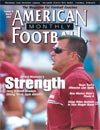AMERICAN FOOTBALL MONTHLY THE #1 RESOURCE FOR FOOTBALL COACHES
Article CategoriesAFM Magazine
|
A Guide to Empowering and Educating Your Athletes About Supplement Useby: Leslie Bonci, M.P.H., R.D.© More from this issue Let’s face it, supplements are here to stay. The lure of Bigger, Stronger, and Faster is irresistible, and all the glossy ads and quick fixes draw athletes like magnets. A Blue Cross and Blue Shield survey of teens using performance enhancers estimates that at least 1 million adolescents have tried these products. A survey conducted by the NCAA estimates that approximately 60% of college athletes have or are currently using nutritional supplements. Certainly, you want to encourage and appropriately enable your athletes to perform to the best of their ability, in as safe a way as possible. Oftentimes the types of supplements, methods of use, or amount consumed may be more performance-impairing....The full article can only be seen by subscribers. Subscribe today!
|
|
|||||||
| HOME |
MAGAZINE |
SUBSCRIBE | ONLINE COLUMNISTS | COACHING VIDEOS |
Copyright 2026, AmericanFootballMonthly.com
All Rights Reserved





